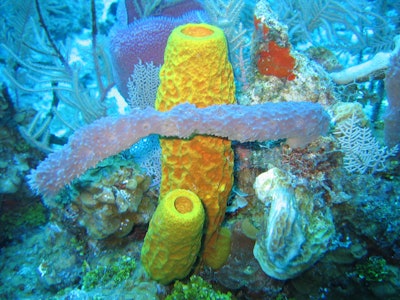
A newly released study suggests that a common — and toxic — flame retardant chemical is produced naturally by bacteria that live in tropical-dwelling sponges.
Ars Technica reports that although scientists previously attributed naturally occurring polybrominated diphenyl ethers — or PBDEs — to sponges, the analysis in the journal Nature Chemical Biology linked them to bacteria within the sponge for the first time.
PBDEs produced in laboratories were widely used as flame retardants in electronics, plastics, textiles, furniture and other products but were restricted because of their tendency to accumulate in the environment. The chemical is reportedly found throughout the marine food chain and in humans.
Scientists from the University of California-San Diego's Scripps Institution of Oceanography and other institutions collected 18 sponge samples from sites near Guam in 2014 and 2015.
Researchers then used a DNA sequencing process called metagenomics to screen for genes that would indicate the ability to synthesize PBDEs from chemical precursors. Of all the organisms in the samples, only the cyanobacteria hormoscilla spongeliae was found to possess the right genes.
"Our results establish the genetic and molecular foundation for the production of PBDEs in one of the most abundant natural sources of these molecules, further setting the stage for a metagenomic-based inventory of other PBDE sources in the marine environment," scientists wrote.






















